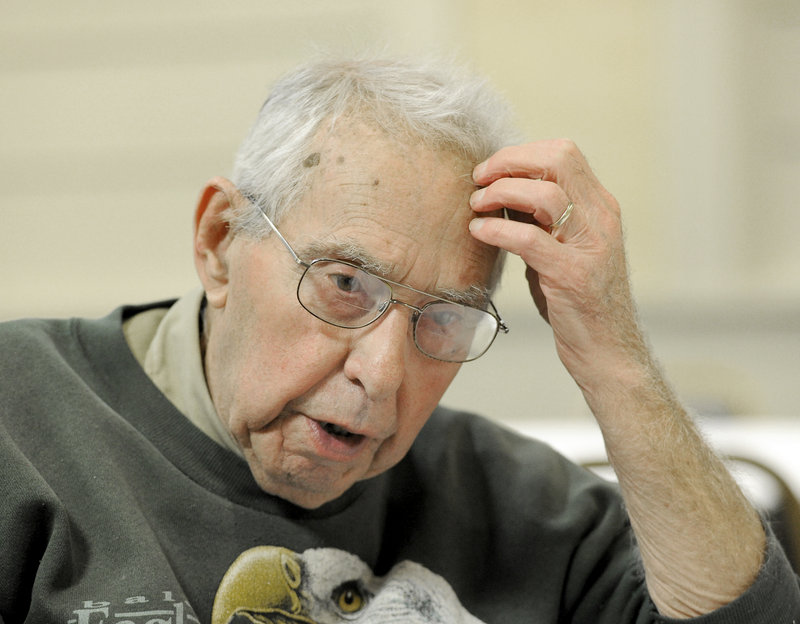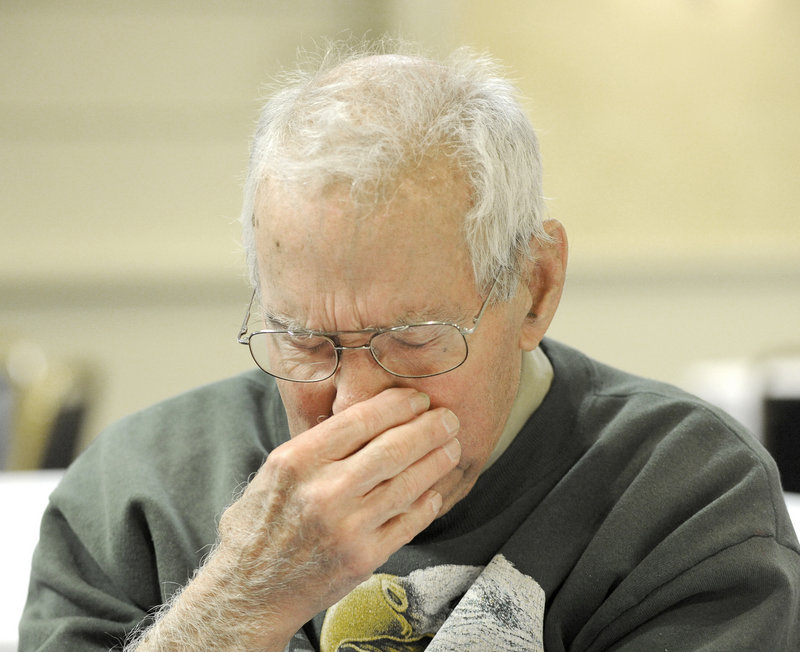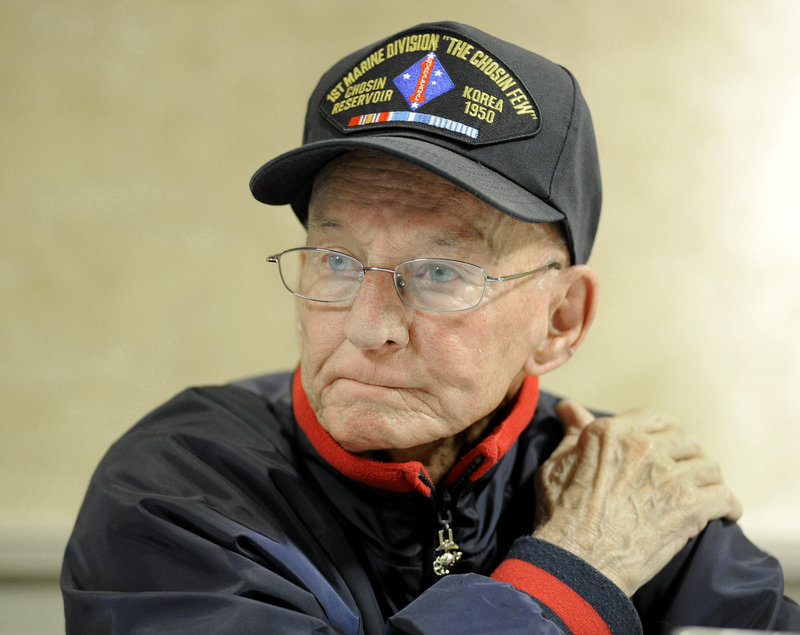PORTLAND – They gathered Tuesday, as they have each month for the past 15 years, in a small meeting room at Seasons Grille. A passer-by might mistake them for an aging Kiwanis club or maybe a local retirees group, drawn together by memories of the good old days.
But the bond among these 20 or so men — most in their 60s, 70s and even 80s — runs much deeper.
To a man, they are former Marines.
Their club has no formal name, no officers, no dues. If you served at any time or any place as a member of the U.S. Marine Corps, you’re in — no questions asked.
Still, with Veterans Day approaching, it seemed a fitting time to pull a few of them aside and quietly pose one simple, or perhaps not-so-simple, question:
Of all the things you experienced during your time in uniform, is there one thing you remember most? One memory that will stay with you forever?
“Yes,” replied Phil Armstrong, 86, of South Portland, looking around as the room filled up. “But it makes me cry, so I’d better not talk about it. After all these years, I still cry.”
Fair enough. Perhaps later? Maybe after lunch?
“Yeah,” Armstrong said with a nod. “Maybe later.”
A few seats down, Jim Hughes, 82, of Gorham showed no such hesitation.
Hughes was a sergeant in Korea with Weapons Company, 2nd Battalion, 7th Marine Regiment. It was there, back in 1950, that he and 15,000 of his comrades found themselves surrounded by 120,000 Chinese troops at the Battle of Chosin Reservoir. To this day, those who survived call themselves the “Chosin Few.”
“It was 4,000 feet up in the mountains, 35 below zero, 2 feet of snow,” Hughes said. “Fifteen thousand of us went up there and we lost 3,000 in two weeks. But we got about 35,000 Chinese.”
And what does he remember most?
“The goddamn cold weather,” Hughes said. “Boy, I’ll tell you, you couldn’t eat, you couldn’t sleep, you couldn’t get warm. You’d take your dirty, wet socks and put them inside your jacket — it was the only way to warm them up!”
The nightmares — usually a Chinese soldier coming at Hughes with a bayonet or a knife — have subsided in recent years. But the searing pain from the frostbite in both feet, both hands and both legs still kicks in right around this time of year, and stays with him until May.
“Not a day goes by that you don’t think about the reservoir or the guys who were there,” Hughes said. “Somebody says to me once, ‘You’re a hero.’ And I say, ‘The guys who didn’t come home are the heroes. We’re not heroes. We’re just lucky to be here.’“
Calvin Lynn, 69, of Portland served for 28 years as a Marine, retiring as a sergeant major in 1991. He led a squad in Vietnam in 1967 and still remembers the young lance corporal named Heathman who one day “got his jaw all blown off.”
As the medics did what they could and packed the wounded lance corporal onto a medevac, Lynn and everyone else in the squad assumed that young Heathman was already dead or soon would be. The chopper took off and the war went on.
Three months ago, Lynn’s phone rang. It was the Navy corpsman who had first treated Heathman, calling from Wisconsin — and sitting right next to him, eager to take the phone, was the one and only Heathman.
“I thought he was dead. For 43 years, I thought the guy was dead!” Lynn said. “I told him if you ever come to Maine, you’d better come visit me. He said he would — and I believe he will.”
Roy Earle, 86, served as a field lineman in an assault signal company during World War II in places like the Marshall Islands, Tinian, Saipan and Iwo Jima.
Earle only tells war stories that have a humorous twist — like the time a guy in his unit dragged a Japanese soldier by his rifle out of a foxhole, threw down his weapon and challenged the bewildered enemy soldier to a fistfight. Or the time Earle helped pilfer some much-needed food from another Marine unit — only to find himself stuck with a stinking can of sauerkraut.
Why only stories that make people laugh? Why not, as Earle calls it, the “gory stuff?”
“Because I don’t like to recall it,” Earle replied. “I lost some good friends, you know, and I just keep pushing it away, pushing it away.”
Which brings us back to Phil Armstrong.
Lunch under their belts, the Marines were hard at work devouring a birthday cake — the Marine Corps was founded by the Continental Congress 235 year ago Wednesday — when Armstrong finally rose from his seat and retreated to a quiet room nearby.
It was February 1945. U.S. forces were hard at work retaking the Philippines, and Armstrong’s job was to call in air support for an assault force that had just liberated a Japanese-run prison in downtown Manila.
Many of the 3,700 prisoners were American and British civilians who had been trapped when the Japanese invaded the islands in 1942. Sprinkled among them were a few military personnel who had wisely shed their uniforms and identification to avoid being tortured or killed.
Even after taking control of the prison, Armstrong’s unit expected a Japanese counterattack.
“So we were all cleaning our weapons and getting everything in order,” he recalled. “That’s when I looked down the road and saw this man coming down with a white shirt on.”
The man, an American, was emaciated. As he approached, he looked at the “USMC” stenciled on Armstrong’s jeep and asked if he could please sit down.
Sixty-five years later, Armstrong still struggles to tell the rest.
“I took him by the arm and I helped him sit down and I asked him if he wanted anything to eat and he said no. They weren’t supposed to eat our food because we didn’t have much left and we had to do the fighting. So he asked if he could have a drink of water and I gave him a drink of water “
Armstrong paused and bowed his head. His shoulders began to tremble.
“Then he asked me if I’d take his hand and so I took his hand and he died right there.”
Moments later, a medic came by and told Armstrong the man was gone. They needed the man’s shirt, the medic said, because many of the women who had been liberated from the prison the day before still had no clothes.
“So I said I’ll get it,” Armstrong said. “I unbuttoned the shirt from bottom to top and I unbuttoned the sleeves. And I took it off and that’s when I saw it.”
It was a dog tag, apparently hidden away along with the shirt for all those years in hopeful anticipation of this day. Stamped across the bottom of the tag: USMC, 1938.
“He was a Marine!” Armstrong said, finally surrendering to his tears. “He’d been in that prison for almost four years and he died the second day he was free He was just skin and bones when I took his hand and laid it down, it was like a feather.”
Again Armstrong paused, lost in that one memory that defies the passage of time. Extending his own arm, he finally said, “How many times in my life have I seen that hand?”
Next door, the luncheon was over. Armstrong collected himself and slowly got up to say goodbye, for another month, to his beloved comrades.
“It’s a young man’s game. We don’t know no better when we’re young,” he said. “Trouble is, the memories don’t leave you.”
Nor, on this day and every day, should our gratitude.
Columnist Bill Nemitz can be contacted at 791-6323 or at:
bnemitz@mainetoday.com
Send questions/comments to the editors.






Success. Please wait for the page to reload. If the page does not reload within 5 seconds, please refresh the page.
Enter your email and password to access comments.
Hi, to comment on stories you must . This profile is in addition to your subscription and website login.
Already have a commenting profile? .
Invalid username/password.
Please check your email to confirm and complete your registration.
Only subscribers are eligible to post comments. Please subscribe or login first for digital access. Here’s why.
Use the form below to reset your password. When you've submitted your account email, we will send an email with a reset code.